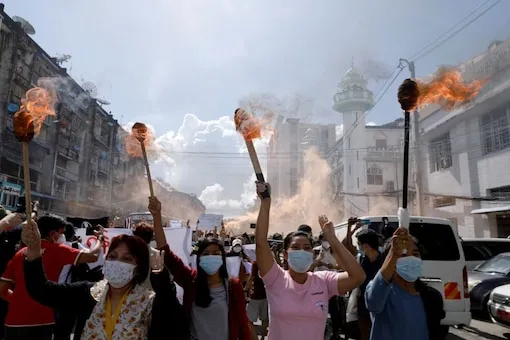
Since the coup in 2021, Myanmar has grown into a warzone as several parts of the nation, particularly the Northwest and Southeast sections, have descended into conflict. Airstrikes by the military junta, such as the one that targeted a school in Depayin Township on 16 September, killing 7 young school children, have shocked the world. The survivors of the attack have been detained by the military on the pretext that the school is a resistance stronghold. As per reports, since the military takeover, nearly 2,000 civilians irrespective of age, gender, or disability, who had been accused of belonging to pro-democracy groups, have been killed during hostilities and other fatal incidents. Approximately, 20,000 public assets, including residential, religious, and educational centres have been demolished. Unfortunately, these statistics understate the extent of violence and destruction as precise numbers are hard to verify. Nevertheless, this helps in understanding the prevailing humanitarian crisis in the nation and the threat it poses to the stability of the region.
Miffed neighbours
The neighbouring nations sharing a border with Myanmar are displeased with the present situation on two grounds: First, the encroachment of air space, as the constant airstrikes by the Junta and the firing of shells into the territory of the neighbouring nations have caused injuries to a few Thai and Bangladeshi people in addition to causing destruction of property. , and lodged a complaint against these incidents.
While the latter acknowledged the firing of multiple mortar shells into the Bangladeshi territory, the Junta tried to absolve itself of the responsibility by putting the blame on insurgent groups. Nevertheless, the Bangladesh government pointed out that it was Myanmar’s responsibility to restrict violence within its borders. In this connection, the Ministry of Foreign Affairs reiterated its ‘zero tolerance policy’ on terrorism for the security of neighbouring countries.
The neighbouring nations sharing a border with Myanmar are displeased with the present situation on two grounds: First, the encroachment of air space, and second, the growing displacement issues.
The Thai side is also facing a similar situation. In July 2022, Thai villagers reported that SAC fighter jets flew 5 kilometres into Thai territory thrice. This created panic and a sense of insecurity amongst the villagers situated on the Thai side. While it was reported that the Thai soldiers were visibly angry at the intrusion of Myanmar fighter jets and ammunition into Thai territory, the Government of Thailand has chosen to gloss over it as Myanmar had apologised.
The second ground of discomfort remains the growing displacement issues. Bangladesh is currently apprehensive that constant air strikes will lead to more displaced Rohingyas as Bangladesh is already struggling to host the refugees who were displaced during the Rohingya crisis in 2017. They have sternly informed Myanmar that they will not allow any more refugees into Bangladesh. Similarly, both Thailand and India are also not capable of accommodating the rising inflow of refugees in a proper manner, as they are not signatories to the 1951 Refugee Convention or its 1967 Protocol. In the first week of September 2022, 500 Myanmar nationals entered the Indian state of Mizoram, which is already catering to more than 30,000 displaced people. Similarly, the Thai side has officially received more than 20,000 but the actual number is expected to be higher. Unlike Dhaka which has been more vocal about its displeasure, both Bangkok and New Delhi have been hesitant in expressing their concerns more openly to maintain their strategic and security interests with Myanmar.
Regional institutions
Whiles regional institutions such as ASEAN have proposed the Five-Point Consensus in the hope of creating steps to open dialogues and reestablish peace within the nation, the reluctance of the Junta to act on some of the points makes it quite evident that this plan has not been working. Whether ASEAN will come out with new and improved propositions that the Junta will adhere to is yet to be seen.
The lack of initiative to formulate any concrete steps among the regional organisations is creating more uncertainty within the region with growing transnational crimes, such as the illegal and unprotected movement of people, resources, and drugs.
BIMSTEC—another sub-regional organisation of which Myanmar, India, Bangladesh and Thailand are members—is yet to devise any tangible strategy to address the security concerns. The lack of initiative to formulate any concrete steps among the regional organisations is creating more uncertainty within the region with growing transnational crimes, such as the illegal and unprotected movement of people, resources, and drugs.
To lessen the toll of violence inflicted within the nation and the region at large, the UN asked countries to halt arms sales to Myanmar; however, this request, unfortunately, has remained unheeded. The nation gets a major proportion of its arms from two major powers, namely China and Russia, who have continued to supply most of Myanmar’s arms, ammunition, and aircraft post the coup. Myanmar has recently further cemented its relations with Russia by signing an atomic energy cooperation deal. This deal hopes to fulfil the military’s long-cherished dream of owning nuclear energy to generate, as they have claimed, electricity. It will be also used for scientific research and medicinal purposes. However, several analysts have raised concerns that the military will use it to create nuclear weapons. If this concern does turn out to be true, it can raise major issues across the world. It is to be noted that Myanmar is a signatory to the Nuclear Non-Proliferation Treaty (NPT) a legally binding international agreement that comprehensively prohibits nuclear weapons. The nation has also signed the Treaty on the Prohibition of Nuclear Weapons in 2018 but is yet to ratify it the Junta’s recent disregard for international law makes it difficult to say whether they will honour these treaties in the future or not.
Much to the disappointment of many, the regional forums have done little to stop the ongoing violence. The current situation demands the designing of new measures, which will more effectively help to subdue the current mayhem that can destabilise the region further.
The views expressed above belong to the author(s). ORF research and analyses now available on Telegram! Click here to access our curated content — blogs, longforms and interviews.




 PREV
PREV


